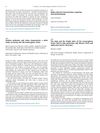Search
for
Sort by
Research
90-120 / 1000+ results
research Network-Based Approaches Reveal Potential Therapeutic Targets for Host-Directed Antileishmanial Therapy Driving Drug Repurposing
Researchers identified five new potential targets for leishmaniasis treatment, suggesting repurposing existing drugs could be effective.

research The Use of Platelet-Rich Plasma in the Treatment of Alopecia - A Review of the Literature
Platelet-Rich Plasma therapy helps increase hair density and regrowth for some types of hair loss.

research Outcome and Clinical-Biological Characteristics of Patients with Advanced Breast Cancer Undergoing Removal of Ovarian/Pelvic Metastases
Patients with advanced breast cancer and high hormone receptor levels who had surgery for ovarian/pelvic metastases lived longer, especially if they had high estrogen receptor levels.
research PI3K-Akt-mTOR and Associated Signaling Pathways as Molecular Drivers of Immune-Mediated Inflammatory Skin Diseases: Update on Therapeutic Strategy Using Natural and Synthetic Compounds
Certain natural and synthetic compounds may help treat inflammatory skin diseases by targeting a specific signaling pathway.

research Bacteria Induce Skin Regeneration via IL-1β Signaling
Skin bacteria, specifically Staphylococcus aureus, help in wound healing and hair growth by using IL-1β signaling. Using antibiotics on skin wounds can slow down this natural healing process.

research Prehyperuricemia: New Milestone in Metabolic Disorders
The article concludes that early diagnosis and lifestyle changes can prevent complications from high uric acid levels.

research Clinical And Preclinical Approach In AGA Treatment: A Review Of Current And New Therapies In The Regenerative Field
New regenerative therapies show promise for treating hair loss.

research Androgen Receptor-Mediated Inhibition of Cutaneous Wound Healing
Lowering testosterone speeds up wound healing in male mice.

research Skin CD4+ Memory T Cells Exhibit Combined Cluster-Mediated Retention and Equilibration with the Circulation
Memory T cells in the skin balance staying put and moving into the blood, clustering around hair follicles, and increasing in number after infection.

research C-Reactive Protein Promotes Adhesion of Monocytes to Endothelial Cells via NADPH Oxidase-Mediated Oxidative Stress
C-reactive protein helps monocytes stick to blood vessel cells by causing oxidative stress.

research Is COVID-19 a Risk Factor for Progression of Benign Prostatic Hyperplasia and Exacerbation of Its Related Symptoms?: A Systematic Review
COVID-19 might worsen symptoms and progression of benign prostatic hyperplasia, possibly due to inflammation and metabolic disturbances in the prostate gland. More research is needed to confirm this.

research The Pathogenesis of Primary Cicatricial Alopecias
The document concludes that more research is needed to better understand and treat primary cicatricial alopecias, and suggests a possible reclassification based on molecular pathways.

research The Dark and the Bright Sides of the Transcription Factor Nrf2 in Skin Protection and Disease
Nrf2 helps protect skin from damage but too much can cause skin problems.

research Improved Cutaneous Wound Healing After Intraperitoneal Injection of Alpha-Melanocyte-Stimulating Hormone
Injecting alpha-melanocyte-stimulating hormone in mice improved skin healing and reduced scarring.

research Pruritus, Allergy and Autoimmunity: Paving the Way for an Integrated Understanding of Psychodermatological Diseases
The conclusion is that understanding the complex relationship between allergies, autoimmunity, and psychological factors is key to treating skin disorders with itching.

research Alopecia Areata: Overview and Insights from January 2018
Alopecia areata is an autoimmune condition causing hair loss, influenced by genetics, stress, and diet, and may be prevented by a high soy oil diet.

research Safety and Efficacy of Leukocyte-Rich Platelet-Rich Plasma in the Treatment of Cicatricial Alopecia
Leukocyte-rich platelet-rich plasma is safe and can potentially help treat scarring hair loss.

research Pathways to Inflammation: Acne Pathophysiology
Acne is caused by genetics, diet, hormones, and bacteria, with treatments not yet curative.

research Anticytokine Therapy, Particularly Anti-IFN-γ, in Th1-Mediated Autoimmune Diseases
Blocking interferon-gamma might help treat various autoimmune diseases.

research Follicular Neutrophilic Inflammation in Hidradenitis Suppurativa
Hidradenitis Suppurativa is likely an autoinflammatory disease, and better understanding its causes could improve treatments.

research Neurogenic Inflammation in Stress-Induced Termination of Murine Hair Growth Is Promoted by Nerve Growth Factor
Stress increases a factor in mice that leads to hair loss, and blocking this factor may prevent it.

research Ovarian Leukocyte Distribution and Cytokine/Chemokine mRNA Expression in Follicular Fluid Cells in Women with Polycystic Ovary Syndrome
Women with PCOS have fewer activated T cells in their ovarian follicles, which might affect fertility.

research Transgenic Mice Overexpressing CD109 in the Epidermis Display Decreased Inflammation and Granulation Tissue and Improved Collagen Architecture During Wound Healing
Mice genetically modified to produce more CD109 in their skin had less inflammation and better healing with less scarring.

research Epidermal Stem Cells in Hair Follicle Cycling and Skin Regeneration: A View From the Perspective of Inflammation
Inflammation plays a key role in activating skin stem cells for hair growth and wound healing, but more research is needed to understand how it directs cell behavior.

research The Disintegrin/Metalloproteinase Adam10 Is Essential for Epidermal Integrity and Notch-Mediated Signaling
Adam10 enzyme is crucial for healthy skin and proper Notch signaling.

research An Investigation of Vitamin D Status in Alopecia Areata
People with alopecia areata often have lower vitamin D levels and more inflammation, suggesting vitamin D might be involved in the condition.

research Anti-Inflammatory and Anti-Hyperplastic Effect of Bazhengsan in a Male Rat Model of Chronic Nonbacterial Prostatitis
Bazhengsan reduces inflammation and tissue growth in chronic prostatitis.

research Chronic Inflammatory Diseases Stimulated by Current Lifestyle: How Diet, Stress Levels, and Medication Prevent Our Body from Recovering
Modern lifestyles, including poor diet, stress, and long-term use of certain medications, hinder the body's ability to heal from inflammation, leading to chronic diseases.

research Short-Chain Fatty Acids from Cutibacterium Acnes Activate Both a Canonical and Epigenetic Inflammatory Response in Human Sebocytes
Short-chain fatty acids from *Cutibacterium acnes* cause skin inflammation, contributing to acne.